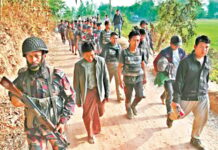21 years in trial

With missing witnesses and lost case documents, a murder case is in limbo for two decades
The High Court has summoned a judge to explain before the court why the trial proceedings of a particular murder case have not been concluded in 21 years.
Hazrat Ali, a young man from Dhaka’s Demra, was killed in 1998 in the capital’s Narinda area. At the same time, his associate Masud Hossain Britain’s hands were severed from the wrists.
Fifth Additional Metropolitan Sessions Court Judge Muhammad Nurul Amin Biplob has to appear before the High Court bench today with an explanation, and documents related to the case.
On April 29, as the High Court was hearing a bail petition of Hedayet, one of the suspects in the case, the bench was astonished by the delay and sought explanation.
Why is the case not moving forward?
The charge sheet submitted by the police says no specific or direct evidence has been found to prove allegations against accused persons.
Witnesses have not appeared before the court in years. On January 6, 2016, the Fifth Additional Metropolitan Sessions Court sent the case to Speedy Trial Tribunal 3. On June 12 that year the tribunal sent the case back.
The tribunal wrote that since the case was a murder case, which could result in capital punishment, the tribunal cannot hand out a verdict while important evidence such as crucial documents are missing. The tribunal had found that there were no postmortem and inquest reports.
Additional Public Prosecutor Md Alamgir Hossain said the prosecution was willing to move the trial proceedings forward.
“But for a long time, witnesses have failed to show up at the court. Several times, the court has even issued non-bailable summons to witnesses, but still they are no-show,” he said.
“Because this is a very old case, I have no idea how the documents went missing,” he added.
On May 1, Assistant Sub-Inspector Biplob Chakrabarty submitted a report to the court saying the police had visited the addresses of each and every witness following the court’s order.
According to the report, no one in those areas could even identify the witnesses, apart from Masud Hossain Britain.
The case, filed by the murdered man’s father, accused ten persons. They are: Tunu alias Sujit Das alias Sattajit Das, Md Hanif, Gobinda Chandra Das and Faysal, who are fugitives; Salim alias Bhagne Selim alias Polash, Alamgir, Jahangir alias Kala Jahangir, Nabi Hossain Nabi and Nadim alias Nazim, who are out on bail and Hedayet alias Kajal alias Kanan, who is in jail.
On March 31, the trial court rejected Hedayet’s bail petition and sent him to jail. Then he filed a bail petition at the High Court.
Lawyer for the plaintiff, Advocate Rashid Mia Badsha, said: “If people cannot get justice in 21 years, it is one kind of injustice. The state and the police have failed to produce the witnesses.”
“Why would witnesses come to court if they feel unsafe?” the lawyer said.
According to case history, in May 1997, Nabi Hossain Nabi filed an attempt to murder case with the Demra police station against Hazrat Ali, Britain, and eight others.
On March 16, 1998, as Ali and Britain were heading to Narinda, the accused allegedly detained them and took them to walled area near Karimullar Bagh. Faysal shot Hazrat and Gobinda, Tunu alias Sujit Dash and others cut off Britain’s hands. Then they sent Hazrat and Britain to Dhaka Medical College in an auto-rickshaw. Doctors declared Hazrat Ali dead upon arrival.
On the same day, Sowkat Ali Fakir, father of Hazrat Ali, filed the murder case. The charge sheet of the case was filed on May 11, 2003 and the court accepted charges on August 8, 2004.









